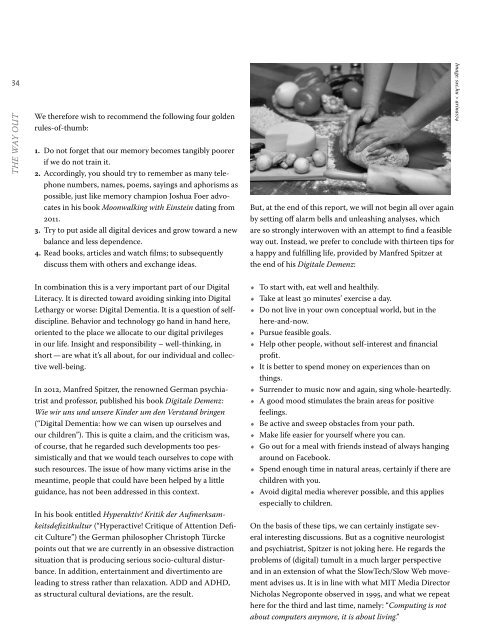VINT-The-Dark-Side-of-Social-Media-Alarm-Bells-Analysis-and-the-Way-Out
VINT-The-Dark-Side-of-Social-Media-Alarm-Bells-Analysis-and-the-Way-Out
VINT-The-Dark-Side-of-Social-Media-Alarm-Bells-Analysis-and-the-Way-Out
You also want an ePaper? Increase the reach of your titles
YUMPU automatically turns print PDFs into web optimized ePapers that Google loves.
34<br />
<strong>the</strong> WaY oUt<br />
We <strong>the</strong>refore wish to recommend <strong>the</strong> following four golden<br />
rules-<strong>of</strong>-thumb:<br />
1. Do not forget that our memory becomes tangibly poorer<br />
if we do not train it.<br />
2. Accordingly, you should try to remember as many telephone<br />
numbers, names, poems, sayings <strong>and</strong> aphorisms as<br />
possible, just like memory champion Joshua Foer advocates<br />
in his book Moonwalking with Einstein dating from<br />
2011.<br />
3. Try to put aside all digital devices <strong>and</strong> grow toward a new<br />
balance <strong>and</strong> less dependence.<br />
4. Read books, articles <strong>and</strong> watch films; to subsequently<br />
discuss <strong>the</strong>m with o<strong>the</strong>rs <strong>and</strong> exchange ideas.<br />
In combination this is a very important part <strong>of</strong> our Digital<br />
Literacy. It is directed toward avoiding sinking into Digital<br />
Lethargy or worse: Digital Dementia. It is a question <strong>of</strong> selfdiscipline.<br />
Behavior <strong>and</strong> technology go h<strong>and</strong> in h<strong>and</strong> here,<br />
oriented to <strong>the</strong> place we allocate to our digital privileges<br />
in our life. Insight <strong>and</strong> responsibility – well-thinking, in<br />
short — are what it’s all about, for our individual <strong>and</strong> collective<br />
well-being.<br />
In 2012, Manfred Spitzer, <strong>the</strong> renowned German psychiatrist<br />
<strong>and</strong> pr<strong>of</strong>essor, published his book Digitale Demenz:<br />
Wie wir uns und unsere Kinder um den Verst<strong>and</strong> bringen<br />
(“Digital Dementia: how we can wisen up ourselves <strong>and</strong><br />
our children”). This is quite a claim, <strong>and</strong> <strong>the</strong> criticism was,<br />
<strong>of</strong> course, that he regarded such developments too pessimistically<br />
<strong>and</strong> that we would teach ourselves to cope with<br />
such resources. <strong>The</strong> issue <strong>of</strong> how many victims arise in <strong>the</strong><br />
meantime, people that could have been helped by a little<br />
guidance, has not been addressed in this context.<br />
In his book entitled Hyperaktiv! Kritik der Aufmerksamkeitsdefizitkultur<br />
(“Hyperactive! Critique <strong>of</strong> Attention Deficit<br />
Culture”) <strong>the</strong> German philosopher Christoph Türcke<br />
points out that we are currently in an obsessive distraction<br />
situation that is producing serious socio-cultural disturbance.<br />
In addition, entertainment <strong>and</strong> divertimento are<br />
leading to stress ra<strong>the</strong>r than relaxation. ADD <strong>and</strong> ADHD,<br />
as structural cultural deviations, are <strong>the</strong> result.<br />
But, at <strong>the</strong> end <strong>of</strong> this report, we will not begin all over again<br />
by setting <strong>of</strong>f alarm bells <strong>and</strong> unleashing analyses, which<br />
are so strongly interwoven with an attempt to find a feasible<br />
way out. Instead, we prefer to conclude with thirteen tips for<br />
a happy <strong>and</strong> fulfilling life, provided by Manfred Spitzer at<br />
<strong>the</strong> end <strong>of</strong> his Digitale Demenz:<br />
• To start with, eat well <strong>and</strong> healthily.<br />
• Take at least 30 minutes’ exercise a day.<br />
• Do not live in your own conceptual world, but in <strong>the</strong><br />
here-<strong>and</strong>-now.<br />
• Pursue feasible goals.<br />
• Help o<strong>the</strong>r people, without self-interest <strong>and</strong> financial<br />
pr<strong>of</strong>it.<br />
• It is better to spend money on experiences than on<br />
things.<br />
• Surrender to music now <strong>and</strong> again, sing whole-heartedly.<br />
• A good mood stimulates <strong>the</strong> brain areas for positive<br />
feelings.<br />
• Be active <strong>and</strong> sweep obstacles from your path.<br />
• Make life easier for yourself where you can.<br />
• Go out for a meal with friends instead <strong>of</strong> always hanging<br />
around on Facebook.<br />
• Spend enough time in natural areas, certainly if <strong>the</strong>re are<br />
children with you.<br />
• Avoid digital media wherever possible, <strong>and</strong> this applies<br />
especially to children.<br />
On <strong>the</strong> basis <strong>of</strong> <strong>the</strong>se tips, we can certainly instigate several<br />
interesting discussions. But as a cognitive neurologist<br />
<strong>and</strong> psychiatrist, Spitzer is not joking here. He regards <strong>the</strong><br />
problems <strong>of</strong> (digital) tumult in a much larger perspective<br />
<strong>and</strong> in an extension <strong>of</strong> what <strong>the</strong> SlowTech/Slow Web movement<br />
advises us. It is in line with what MIT <strong>Media</strong> Director<br />
Nicholas Negroponte observed in 1995, <strong>and</strong> what we repeat<br />
here for <strong>the</strong> third <strong>and</strong> last time, namely: “Computing is not<br />
about computers anymore, it is about living.”<br />
Image: sxc.hu > arinas74


